Intel has been active in the esports space for more than a decade, including marketing activations before the tech giant partnered with ESL to sponsor the Intel Extreme Masters (IEM). That global esports tournament is in the midst of its 12th season and has seen both attendance and livestreaming numbers increase as esports has emerged into a global phenomenon.
Lee Machen, director of developer relations at Intel, told AListDaily that the brand used E3 to kickstart new esports activations to expand its footprint with ESL and to incorporate virtual reality into its esports offerings.
“We’ve entered into a very broad expansion of our relationship with ESL from a technology partner standpoint, and we’re going to be powering not only the events that they run with us around Intel Extreme Masters, but all the events that ESL runs like DreamHack, ESL One and any other event that they’re involved with,” Machen explained. “We’re going to be right there with them on the PC side, on the server side, and on everything in-between. We’re going to be their broad-based technology partner.”
In addition to working with ESL on the technology side and as a title sponsor partner on Intel Extreme Masters, Machen said Intel will be very involved on the consumer-facing side at ESL One and DreamHack and other big properties to connect the brand with the global esports audience. The brand is front and center with the Intel Grand Slam, a new activation that awards one million dollars to a Counter-Strike: Global Offensive (CS:GO) team that wins four of ten ESL events.
“That’s going to add some attention and some excitement among the teams that play Counter-Strike at these events that we’re working on with ESL that will be qualified for that prize pool,” Machen said.
Intel’s recent announcements show that the company is in on esports for the long haul.
“When we got started in esports, nobody knew that it was going to grow into what it’s become today, where it’s rivaling traditional sports’ viewership,” Machen said. “We thought at the time that we had to be involved because esports was born out of PC gaming and it uses everything that we can provide on the platform. The level of growth that we’ve seen to this point—where we in a couple of years, there will be over half a billion people watching esports on an annual basis—I don’t think we had any idea it was going to grow to that extent. But the investments we’re making are in an attempt to continue to grow that audience and engagement as much as possible.”
Machen says esports remains a relatively young and enthusiastic community. By getting in early, Intel has been able to put its brand front and center with this community. “That’s hugely valuable to us and our brand, and the trust that we have with that category of customers,” Machen added.
IEM Katowice saw brands such as Sprite and Gillette tap into that PC gaming audience in Poland.
“Other brands that didn’t participate directly in esports like we have—companies like Gillette and Coke—coming on board is going to continue to grow, and it’s worth their time and their advertising investments to come into esports,” Machen said. “But in turn, that money then flows to the events and to the teams and brings more players and raises the level of competition to the point where it’s going to continue this cycle of growth. More money coming in fuels better and better competition, which in turn brings more fans, which is going to bring in more advertising dollars. So, we welcome anybody who wants to come aboard the esports bandwagon.”
For next season, Riot Games is selecting ten teams to join the developer with a $10 million franchise fee and participate in the League of Legends Championship Series (LCS).
“There’s a handful of top titles in esports today that aren’t going anywhere, and I’m not surprised that the owners of those titles are starting to get a little more protective of those titles and want to run those tournaments themselves because it’s getting more competitive as far as attention and team focus,” Machen said. “We’re going to continue to grow the sport, not just as far as viewers for the titles that are at the top today, but with new games and new types of titles that are going to continue to come in.”
One of the new pushes for Intel and esports is virtual reality. After offering playable VR games for attendees to IEM events last season, this season is taking things a step further with VR competition.
“We’re working with Oculus on two Oculus Touch titles, The Unspoken and Echo Arena, and we’re putting together a competition with several events that will ladder up to the Grand Finals in Katowice, Poland next year,” Machen said.
Intel is also sponsoring Oculus and making Echo Arena free to Oculus Rift owners for a limited time, which Machen hopes will bring additional interest into the competitive VR area. VR esports will also open up new opportunities for brands.
“The more time people spend in VR, the more things that exist in the real world are going to start to get built in VR as well,” Machen said. “From an advertising standpoint that would certainly be among the first to enter VR esports because that’s what powers a lot of the revenue around sports in general. I certainly see that becoming a thing as soon as there’s a big enough audience watching in VR to make it a worthwhile investment for some of the companies we discussed earlier, like Gillette.”

